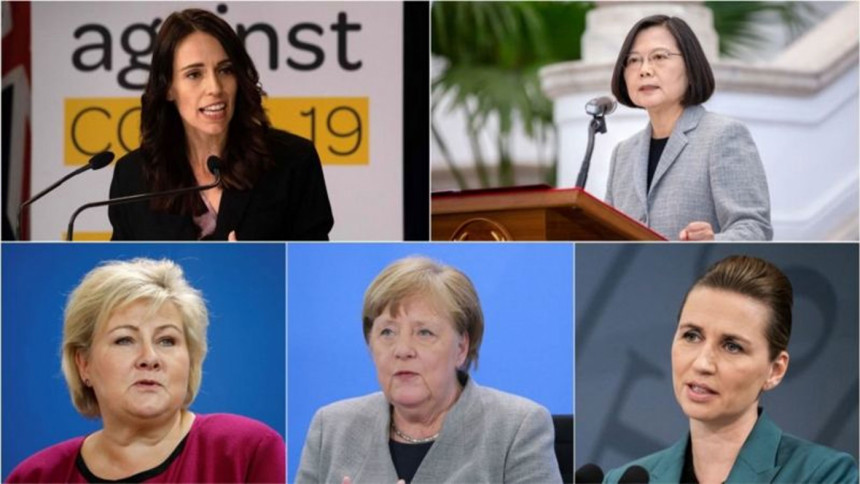Covid-19 response by women leaders: Will this change the quality of leadership?

Frontline healthcare workers, community mobilisers, caregivers, mothers working from home while supporting children with online classes—women of Bangladesh and all other parts of the world have been facing the Covid-19 pandemic with immense strength, courage, patience, and resilience. I have been thinking of ordinary women performing extraordinary responsibilities in the context of the discussion on women leadership in managing the global pandemic.
One study found that outcomes related to Covid-19, including the numbers of cases and deaths, were systematically better in countries led by women. Countries with women as heads of state such as Denmark, Finland, Iceland, New Zealand, Germany, and Slovakia have been internationally recognised for the effectiveness of their response to the pandemic. These women leaders were proactive and pragmatic in responding to the threat of the virus. They implemented social distancing restrictions early and sought expert advice to inform health strategies. They were also able to unify the country around a comprehensive response with transparent and compassionate communication. They did not take unnecessary risks and did not underestimate the threats posed by the virus. This was done by several male leaders, which had negative consequences and led to more deaths and suffering.
The performance of female leaders received widespread attention by the media. Academics studying leadership are also engaged in analysing this. Numerous articles have examined individual strengths. For example, German Chancellor Angela Merkel's data-driven approach has been appreciated. New Zealand Prime Minister Jacinda Ardern's Covid-19 response has been termed as a "masterclass in crisis leadership" for her empathetic rationality and effective communication.
Various factors beyond leadership are involved in managing a crisis. Each nation confronted Covid-19 with its own advantages and disadvantages (e.g. educational level, income, income inequality, density, demographic profile, etc.). It is too early to have rigorous evidence to claim that women are managing the pandemic better. However, this has clearly generated a discussion on women leadership in general.
According to a 2020 article called "Will the Pandemic Reshape Notions of Female Leadership?" by Tomas Chamorro-Premuzic and Avivah Wittenberg-Cox (published in the Harvard Business Review), "This group of talented leaders may become the first visible wave of role models for the generations to come, redefining the way we pick leaders in politics and business. In short, tales of strong female leaders succeeding through this crisis could lead to a change in the overarching narrative of what a strong leader looks like. Society at large may become less surprised and more accepting of leaders(s) elected on their expertise, intelligence, curiosity, humility, empathy, and integrity."
Women govern only 18 countries (or, 545 million people) globally. That is, only seven percent of the world's population. A recent study by CARE found that only 24 percent of the positions on national level committees established to respond to Covid-19 are held by women. Society has different expectations from male and female leaders, and women in most regions of the world still face the glass ceiling while reaching top positions in various sectors. How to address the structural and attitudinal barriers is a topic for another article. However, the recognition of women leaders in the context of the Covid-19 pandemic is particularly encouraging, especially when people usually like men more when they become successful, while the likeability of women decreases as they gain success. There is decades' worth of social science research by psychologists like Susan Fiske at Princeton, Amy Cuddy at Harvard, and others, which has repeatedly found that women face specific social penalties for doing things that lead to success.
The ongoing global pandemic is threatening to roll back progress on achieving most Sustainable Development Goals. For example, "Covid-19: A threat to progress against child marriage"—a report released by UNICEF on International Women's Day 2021—warned that school closures, economic stress, service disruptions, pregnancy, and parental deaths due to the pandemic are putting the most vulnerable girls at increased risk of child marriage. Ten million additional child marriages may occur before the end of the decade. If we continue with a business-as-usual approach, it will not be possible to cope with the loss due to the pandemic.
Even before Covid-19, we were living in a unique time of human history. The world is richer than ever before. But inequality is increasing, which has given rise to protests in different regions. Economic insecurity, fiscal austerity, migration, and violent extremism have contributed to political polarisation and people's declining trust in institutions. Millions of people are becoming refugees and displaced as a result of wars and conflicts. We have also witnessed a backlash against human rights. Children all over the world walked out of classrooms to demand that political leaders take actions to address climate emergency. While information technology has revolutionised work, education, communication and entertainment, it has also created challenges for social, political and legal systems.
Covid-19 exposed the limitations of the existing political, economic and social systems and reminded us of the importance of a fairer, greener and more equitable world. In a post-Covid-19 phase, how can we ensure social justice for all groups, leaving no one behind, while also progressing economically? How are we going to define our relationship with our planet and protect our fellow species, as well as our collective future? How should we respond to the emerging child and human rights concerns due to the unprecedented advancement of technology?
We should be courageous enough to reimagine bold and innovative solutions to address the most compelling challenges of our time. Going back to "normal" is not good enough, as the status quo did not protect the rights and dignity of all human beings and also disrupted the environmental balance to the extent that we are faced with an existential crisis. If we are to create a new world, we need different types of leaders who will work with vision, commitment, honesty, creativity and hopefulness.
Will our experiences of female leadership during the pandemic influence our willingness to elect more women into power and promote their leadership at all levels? Will it improve the quality of leaders in general? The long-term impact of Covid-19 on these aspects of our societies is yet to be seen.
Laila Khondkar is an international development worker.


 For all latest news, follow The Daily Star's Google News channel.
For all latest news, follow The Daily Star's Google News channel. 



Comments